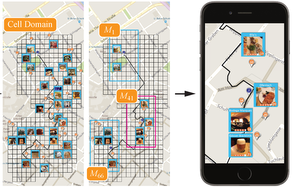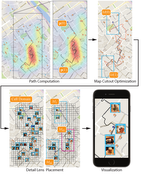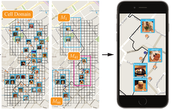Information
- Publication Type: Journal Paper (without talk)
- Workgroup(s)/Project(s):
- Date: May 2018
- DOI: 10.1109/TVCG.2017.2690294
- ISSN: 1077-2626
- Journal: IEEE Transactions on Visualization and Computer Graphics
- Number: 5
- Volume: 24
- Pages: 1784 – 1798
Abstract
We present a novel framework for visualizing routes on mobile devices. Our framework is suitable for helping users explore their environment. First, given a starting point and a maximum route length, the system retrieves nearby points of interest (POIs). Second, we automatically compute an attractive walking path through the environment trying to pass by as many highly ranked POIs as possible. Third, we automatically compute a route visualization that shows the current user position, POI locations via pins, and detail lenses for more information about the POIs. The visualization is an animation of an orthographic map view that follows the current user position. We propose an optimization based on a binary integer program (BIP) that models multiple requirements for an effective placement of detail lenses. We show that our path computation method outperforms recently proposed methods and we evaluate the overall impact of our framework in two user studies.Additional Files and Images
Additional images and videos
Additional files
Weblinks
BibTeX
@article{birsak-2017-dpe,
title = "Dynamic Path Exploration on Mobile Devices",
author = "Michael Birsak and Przemyslaw Musialski and Peter Wonka and
Michael Wimmer",
year = "2018",
abstract = "We present a novel framework for visualizing routes on
mobile devices. Our framework is suitable for helping users
explore their environment. First, given a starting point and
a maximum route length, the system retrieves nearby points
of interest (POIs). Second, we automatically compute an
attractive walking path through the environment trying to
pass by as many highly ranked POIs as possible. Third, we
automatically compute a route visualization that shows the
current user position, POI locations via pins, and detail
lenses for more information about the POIs. The
visualization is an animation of an orthographic map view
that follows the current user position. We propose an
optimization based on a binary integer program (BIP) that
models multiple requirements for an effective placement of
detail lenses. We show that our path computation method
outperforms recently proposed methods and we evaluate the
overall impact of our framework in two user studies.",
month = may,
doi = "10.1109/TVCG.2017.2690294",
issn = "1077-2626",
journal = "IEEE Transactions on Visualization and Computer Graphics",
number = "5",
volume = "24",
pages = "1784--1798",
URL = "https://www.cg.tuwien.ac.at/research/publications/2018/birsak-2017-dpe/",
}


 preprint
preprint



